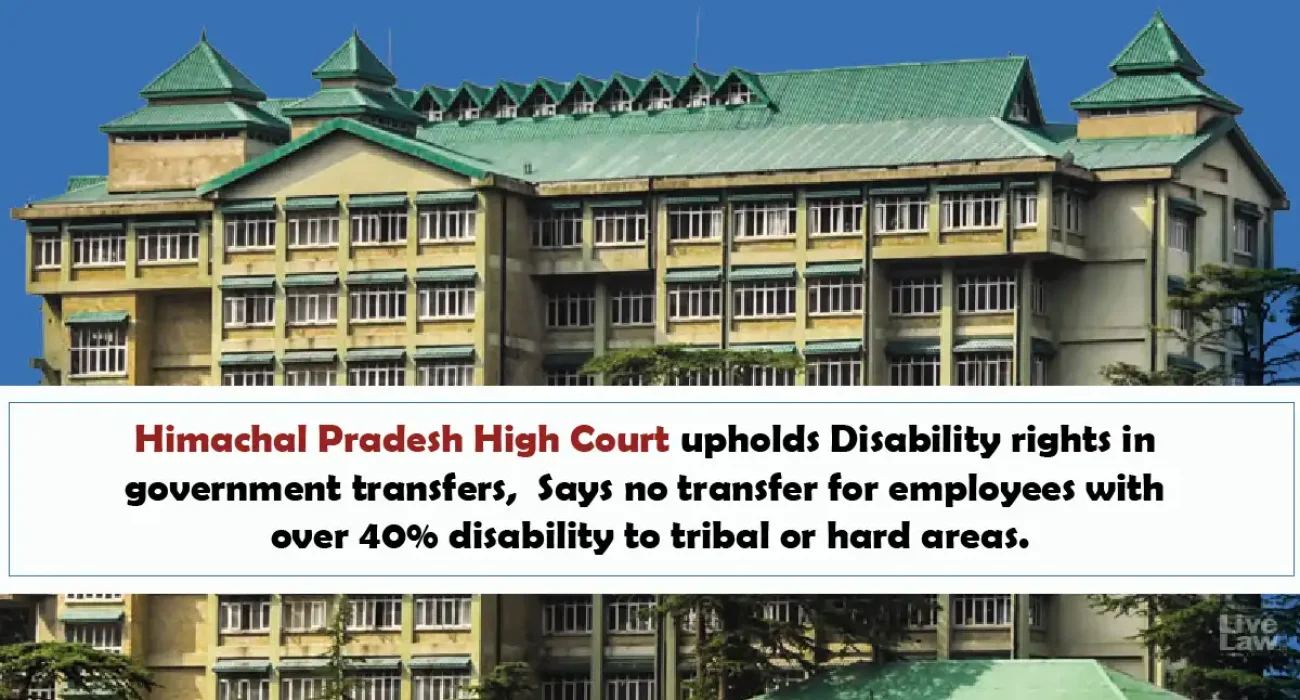

In a recent ruling, the Himachal Pradesh High Court has reinforced the protection of rights for employees with disabilities in relation to government transfers. The case involved a visually impaired government teacher who challenged his transfer to a designated “hard area” school, arguing that the decision violated the state’s transfer policy and the rights of persons with disabilities.
Table of Contents
ToggleThe petitioner, a visually impaired teacher employed at the Government Girls Senior Secondary School in Rampur, Shimla District, was transferred to the Government Senior Secondary School in Sarpara, also located in Shimla District, a designated “hard area.” The petitioner, who has a visual impairment of over 40%, contested the transfer order, arguing that it violated Himachal Pradesh’s transfer policy, which exempts individuals with significant disabilities from being posted to hard or tribal areas.
Despite submitting a formal representation requesting the cancellation of the transfer, the petitioner received no response from the authorities. As a result, the petitioner approached the Himachal Pradesh High Court seeking a stay on the transfer order.
The petitioner’s counsel, Mr. Mukul Sood, argued that the transfer violated both the state’s transfer policy and the rights of persons with disabilities, as outlined under the Rights of Persons with Disabilities Act, 2016. The counsel highlighted that the petitioner had not completed his regular tenure at the current school and should not have been transferred to a hard area due to his visual impairment. Additionally, the counsel raised concerns regarding alleged political influence used by another government employee and his spouse to facilitate favorable transfers, suggesting that the petitioner had been unfairly targeted.
On the other hand, the respondent’s counsel, Mr. B.C. Verma, the Additional Advocate General, contended that although the petitioner had not completed his normal tenure at the current school, the petitioner had served in or near the present location for over four years. He argued that the transfer order was not illegal, stating, “Since petitioner herein has never served in a hard area, no illegality can be said to have been committed by the respondents, while issuing impugned transfer order.”
The High Court acknowledged that the petitioner has a visual impairment of over 40%, qualifying him as a person with a benchmark disability under Section 2(r) of the Rights of Persons with Disabilities Act, 2016. The Court noted that such individuals are entitled to specific protections, including exemption from transfers to hard or inaccessible areas.
The Court observed that although the petitioner had served at his current school for nine months, the overall record indicated that he had worked in the region for over four years. However, the Court emphasized that the transfer to a hard area was contrary to the protections afforded to individuals with disabilities. The Court stated:
“There is no dispute to the effect that petitioner is visually impaired, and he belongs to Tehsil Theog, District Shimla; he otherwise could not have been transferred to a hard area.”
The Court directed the authorities to expeditiously consider the petitioner’s pending representation, which sought the cancellation of the transfer, in accordance with the state’s transfer policy and the applicable provisions for persons with disabilities. The Court instructed that this decision be made within four weeks.
Until a decision was made on the representation, the Court ordered a stay on the transfer. The Court also directed that the petitioner be given an opportunity to be heard, and that a detailed speaking order be issued on the matter.
Credits: Adv. Deeksha Rai
IAW resources
Browse our help directory